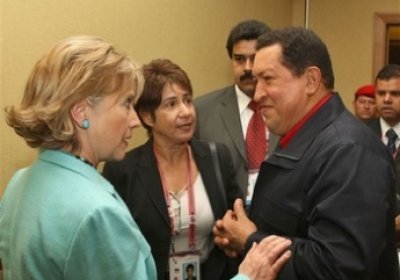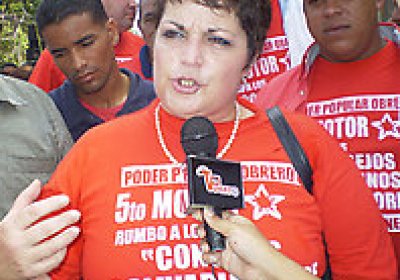In response to the U.S. State Department’s condemnation of the unauthorized release of more than 250,000 diplomatic cables by the website Wikileaks, Venezuelan President Hugo Chavez praised the whistleblower site and called for the resignation of U.S. Secretary of State Hillary Clinton.
James Suggett
On his TV show Alo Presidente on October 3, Venezuela’s President Hugo Chavez drove tractors and inspected corn crops as he pledged to accelerate land reform and increase the government’s share of food production and distribution.
Chavez announced the nationalisation of the agricultural supplies company Agroislena and the Venezuelan properties of the British Vestey Group.
The show took place in Guarico state, where Chavez’s United Socialist Party of Venezuela (PSUV) won most of the state seats in the September 26 National Assembly elections.
Factory workers from the Venezuelan chemical and lubricant company Veneco held a demonstration on the evening of October 10 in Carabobo state to show their support for the company’s nationalisation.
President Hugo Chavez announced the nationalisation that afternoon.
Jose Martinez, the general secretary of the Venoco workers’ union, said: “We are endorsing this takeover that will bring us many benefits.
“It will bring a change from the capitalist mode to the socialist mode and we are going to strengthen our company.”
The struggle against inflation, corruption, and destabilisation in Venezuela’s economy is continuing.
In the last week of May, workers from nationalised companies marched to protest hoarding and price speculation and call for worker-run management, while national investigators arrested the former president of the state-run food company PDVAL for alleged involvement in the diversion of food from the market.
To guarantee access to essential foods amid price inflation and supply shortages in some items, the Venezuelan government recently nationalised a major flour producer, granted low-interest credits to small and medium-sized producers, opened new subsidised food markets, sanctioned price speculators and hoarders, and is in the process of reforming its land reform law.
The United Socialist Party of Venezuela (PSUV) concluded its five-month extraordinary congress on April 25 with the approval of highly anticipated party principles and statutes. This was just in time for primaries on May 2, in which millions of PSUV members will choose parliamentary candidates to run against a newly united opposition platform called the “Democratic Alternative” in September.
Venezuelan President Hugo Chavez declared on November 8 that his country is prepared to defend itself against a possible act of aggression from Colombia or the United States.
The government has taken over Venezuela’s two largest coffee makers, Fama de America and Cafe Madrid. FdA has been nationalised and CM turned into a partially state-owned mixed-enterprise.
Thousands of peasant rights’ activists marched in Guarico, Venezuela on Thursday to demand an end to impunity for the killings of 220 farmer organizers since the 2001 Land Reform Law was passed. The march was sparked by two recent attacks presumed to have been planned and paid for by large estate owners against well-known land reform activists.
During his address to the 64th United Nations General Assembly in New York on Thursday, Venezuelan President Hugo Chavez called on the world to join Latin American countries in constructing a new type of socialism. He also said U.S. President Barack Obama has brought the "smell of hope" to the U.N., and demanded a return of the democratically elected president to Honduras, an end to the blockade of Cuba, and "decisive" action on climate change.
US author, dissident intellectual, and Professor of Linguistics at the Massachusetts Institute of Technology Noam Chomsky met with Venezuelan President Hugo Chavez for the first time on August 31. Together they analysed hemispheric politics during a nationally televised forum.
The president of Venezuela’s National Statistics Institute (INE), Elias Eljuri, said on August 7 that since Hugo Chavez took office in 1999, “Poverty has been dropping ... from 49% in 1998 to 26.4% in 2009”.
- Page 1
- Next page




